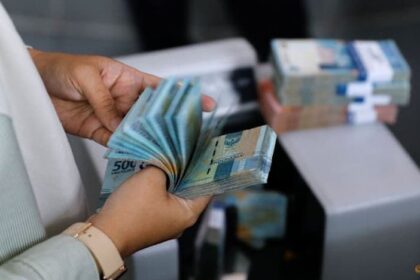Before dawn arrest exposes a SIM pipeline at Thailand’s eastern border
Thai border rangers in Sa Kaeo province detained three foreign men in the early hours on Sunday after an illegal crossing from Cambodia. Officers seized more than 1,000 mobile SIM cards, packed inside the Chinese suspect’s luggage, and now suspect the shipment was destined for the scam hub of Myawaddy in Myanmar. A joint patrol of the Aranyaprathet Special Task Force and the 1204th Ranger Company set out around 1.15 am to disrupt smuggling and covert crossings along natural trails behind Non Khilek village in Aranyaprathet district. The team encountered three men walking from Poipet without travel documents. They were detained and taken to a ranger base for questioning.
- Before dawn arrest exposes a SIM pipeline at Thailand’s eastern border
- Why 1,000 SIM cards matter to scam syndicates
- Myawaddy and the expanding scam corridor
- The cross border supply chain, from SIM boxes to satellite links
- How mass SIMs and SIM boxes enable fraud at scale
- The human cost behind Southeast Asia’s scam economy
- Enforcement and policy responses
- What happens next in the Aranyaprathet case
- How to protect yourself from call center scams
- Key Points
According to investigators, the Chinese national admitted he had smuggled the SIM cards from Poipet and planned to hand them to a Chinese boss in Myawaddy, a frontier town widely linked to call center operations. The other two men, an American and an Indian citizen, told officers they were headed to Bangkok for personal errands. They said they had paid smugglers for the crossing, although no guide was with them at the time. All three were later transferred to Khlong Nam Sai police station along with the seized cards for legal action on charges of illegal entry, while authorities examine whether the SIM haul is tied to a broader transnational cybercrime network.
The arrest fits a pattern that Thai security agencies have been seeing along both the Cambodian and Myanmar borders. Scam groups rely on a steady flow of communication tools, especially prepaid SIM cards and SIM box equipment, to make internet calls appear local and to register accounts used for fraud. Investigators say Thailand has become a transit corridor because it sits between key scam bases in Myanmar and supply sources in Cambodia, and because its telecom infrastructure offers both coverage and low costs that the syndicates can exploit.
Why 1,000 SIM cards matter to scam syndicates
Prepaid SIM cards are the fuel that keeps scam call centers and online fraud teams running. A single operation can cycle through hundreds or thousands of numbers to open messaging accounts, receive one time passcodes, make untraceable calls, and manage a steady churn of victims. When callers show a local number, victims are more likely to pick up. When a fraudster can register dozens of accounts per shift, blocking one account barely slows activity.
Many countries require real name registration of SIM cards, but criminal networks work around those rules by buying in bulk through straw buyers, using forged identities, or recycling cards before operators can deactivate them. The cards are cheap, easy to conceal, and simple to replace. A courier who can move 1,000 cards across a border provides weeks of capacity for a medium sized call center. Syndicates also pair large batches of SIMs with SIM boxes, devices that route internet calls through local mobile networks. This blend of hardware and prepaid cards disguises caller identity and location, producing a high volume of local looking traffic that is difficult to trace in real time.
Myawaddy and the expanding scam corridor
Myawaddy, opposite Mae Sot in western Thailand, has become shorthand for an entrenched scam economy. Security assessments describe large compounds filled with workers who run romance fraud, investment schemes, online loan scams, and cryptocurrency swindles that target victims across Asia, Europe, and North America. Estimates put the number of people working in or around scam sites in the hundreds of thousands across Myanmar and Cambodia. A United Nations assessment estimated losses in East and Southeast Asia of roughly 18 to 37 billion dollars in 2023, a figure that does not capture knock on losses borne by victims and banks in other regions.
Crime groups have adapted to pressure. When police attention intensifies in one district, operators shift to new sites along the Thai border, including areas far south of Mae Sot. Some compounds sit in zones held by armed groups that tax or protect the businesses. Others operate in casino enclaves or special economic areas with light oversight. What allows these enterprises to function is access to power, internet connectivity, and a steady supply of SIM cards. When authorities target utilities, operators switch to generators and satellite internet kits to stay online. The arrest in Sa Kaeo fits this logic. If SIM supply chains are squeezed on one frontier, couriers seek new routes through neighboring provinces and countries.
The cross border supply chain, from SIM boxes to satellite links
Scam centers run on simple components that can be sourced and moved quickly. The core is cheap phones or computers, prepaid SIM cards, and a way to pipe internet calls through local networks. SIM boxes, which are racks that hold many SIM cards, convert internet based calls into local mobile calls. A single rack can host dozens of lines. Operators rotate SIMs to avoid blocking and rely on bulk cards to replace those that are flagged. Thai police have also encountered routers, antennas, and satellite internet kits that keep compounds online even if authorities try to cut fiber connections.
Recent arrests in southern Thailand illustrate the pattern. Police at the Sadao border have seized SIM box equipment believed to support scam traffic targeting Thai residents. Investigators say such systems convert overseas voice over internet calls into local calls, masking their origin and lowering costs for the scammers. The same networks rely on couriers to bring in large numbers of SIM cards, which staff then load into SIM boxes, phones, and messaging apps to reach victims at volume.
How mass SIMs and SIM boxes enable fraud at scale
To understand the risk in a haul of 1,000 cards, it helps to examine how scam teams work. A typical crew runs chat scripts and call scripts in shifts. They contact many leads, move a smaller group into ongoing conversations, and guide a fraction into sending money. That funnel only works with scale. Every additional SIM enables new accounts and fresh call attempts. When one channel is blocked, the team switches to another SIM and continues. SIM boxes make this even more efficient. They allow a central server to pick a local SIM and place a call through the mobile network, which shows a familiar prefix to the target and avoids an international number that would raise suspicion.
Telecom operators deploy filters and analytics to detect suspicious patterns, but high volume rotations and constant re registration make enforcement difficult. When a courier delivers a thousand cards to a hub like Myawaddy, that hub can keep churning calls and texts for weeks. The arrest at Aranyaprathet therefore looks small on paper, but it strikes at a critical resource for larger networks.
The human cost behind Southeast Asia’s scam economy
Behind the flow of SIM cards and devices are people. Many workers who end up inside scam sites are recruited through fake job offers and later coerced into fraud. Accounts gathered by rescue groups and international agencies describe confiscated passports, forced labor, and violence when recruits fail to meet targets. The pandemic made conditions worse by pushing some casino linked businesses to pivot to online scams and by increasing the pool of job seekers who were easy to deceive.
A wide range of nationalities now shows up in rescue operations and police files, including citizens of China, India, the Philippines, Vietnam, African states, and Western countries. Some recruits enter with eyes open, drawn by promises of quick money, while others are trafficked and then trapped by threats and debt. Governments and rights groups call for treating those forced to work in scam rooms as trafficking victims and for focusing criminal accountability on organizers, financiers, and the landlords who host the compounds.
Enforcement and policy responses
Thai and Chinese coordination
Thai police and Chinese public security agencies have increased joint operations that target call center bosses, recruiters, and logistics teams across the Thai Myanmar belt. That cooperation includes information sharing, repatriation of suspects, and efforts to disrupt utilities and services used by fraud camps near Myawaddy. Thai units have stepped up border patrols in Sa Kaeo and Tak provinces and empowered immigration officers to act quickly against suspected facilitators. International bodies, including the United Nations Office on Drugs and Crime, have encouraged tighter regional coordination against cyber scams and trafficking.
Financial defenses
Financial regulators in Thailand have pushed banks and payment providers to monitor suspicious flows more closely. The Bank of Thailand has pressed institutions to improve verification, flag mule accounts, and move faster on law enforcement requests. Curtailing the money pipeline is essential, since the fraud model depends on fast transfers through local accounts before funds are cashed out or converted into cryptocurrency.
Targeting supply lines
Thai authorities have prioritized intercepting the physical tools that keep scam centers running. Police have seized SIM boxes, routers, satellite dishes, and bulk SIM cards at checkpoints and in follow up raids. Cutting the supply of prepaid cards, combined with strict checks on telecom registration, raises the cost of operating a scam room and reduces the throughput of calls and messages. Investigations tied to the Sa Kaeo arrest will likely trace the serial numbers of seized SIMs, analyze call and data patterns, and coordinate with telecom regulators to identify the distributors behind the shipment.
What happens next in the Aranyaprathet case
The three men detained near Non Khilek face charges of illegal entry. Immigration law provides for detention, fines, and deportation, with additional charges possible if links to organized fraud are proven. Investigators will examine the contents of the Chinese suspect’s bags, including packaging and any documentation that could point to suppliers or buyers. Contact lists, travel routes, and payment trails could help map a bigger network. If the SIM batch matches numbers previously flagged in scam complaints, that would strengthen the case for charges related to cybercrime and illegal telecom equipment.
Authorities also want to know whether the American and Indian nationals were couriers, lookouts, or simply opportunistic crossers. Their statements will be weighed against phone records and movement logs. Even if no direct link to the SIM haul is confirmed for those two men, the detention highlights the draw of the Thai Cambodia border for people seeking to bypass formal checkpoints for a range of reasons.
How to protect yourself from call center scams
The Sa Kaeo case is a reminder that the fraud industry is persistent and adaptive. Consumers can reduce risk with a few simple practices.
- Be cautious with unsolicited calls and messages, especially those that claim to be from banks, police, or delivery firms.
- Do not share one time passcodes, banking credentials, or remote access to your device.
- Verify requests using a phone number or website you find independently, not one provided in a message.
- Be skeptical of investment tips from new online contacts, especially if they push quick returns or ask you to move to a private chat app.
- Report suspicious calls and text messages to your bank and to national hotlines so patterns can be traced and blocked.
- Use strong authentication on financial accounts and review transactions frequently.
Key Points
- Thai rangers in Sa Kaeo detained three foreign nationals who crossed illegally from Cambodia and seized more than 1,000 SIM cards.
- The Chinese suspect told officers he was delivering the cards to a boss in Myawaddy, a town widely associated with scam compounds.
- Authorities suspect the haul was part of a supply chain that feeds call centers with prepaid numbers for calls, messaging, and account registrations.
- Scam hubs along the Thai Myanmar border rely on SIM cards, SIM boxes, power, and satellite internet to keep fraud operations running.
- International assessments put losses from scams across East and Southeast Asia in the tens of billions of dollars in 2023.
- Thai and Chinese agencies have increased joint crackdowns, while Thai regulators press banks to tighten controls on suspicious transfers.
- Recent cases in southern Thailand show the seizure of SIM box systems used to convert internet calls into local calls and avoid detection.
- The three men face illegal entry charges as police probe possible links to a transnational cybercrime network.












